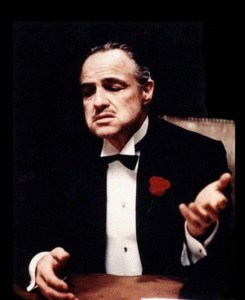
Time Warner Cable and Cablevision customers: Is Charter Cable in your future?
The best way the cable industry can grow revenue in the lucrative broadband business is to bring back the same type of collusion and control cable companies maintained over video programming 20 years ago.
Dr. John Malone did not want to sound nefarious in his recent interview with CNBC’s David Faber, but the new part-owner of Charter Communications has built a reputation as cable’s Darth Vader over the last 30 years. His detractors consider his way of doing business akin to a nationwide cable mafia, complete with exclusive, non-competitive territories that assure operators can charge sky-is-the-limit prices.
Malone is now back in the cable business in a big way, and analysts expect he will quickly amass influence in an industry he once led as CEO of the nation’s then-largest cable operator — Tele-Communications, Inc. (TCI).
[flv]http://www.phillipdampier.com/video/CNBC Malone is Back Into Cable 4-13-13.mp4[/flv]
Why is John Malone back in the cable business and why buy a piece of Charter Cable? Malone tells CNBC’s David Faber Charter is a company with enormous growth potential through mergers and acquisitions. CNBC says Malone could be targeting Time Warner Cable and Cablevision for acquisition by Charter as early as next year. “There is consolidation yet to be done,” Malone hints. (7 minutes)
Malone notes the cable industry is on the cusp of transformative consolidation through collaborative agreements, mergers, and outright acquisitions both here and abroad. CNBC speculated that could begin with efforts to further reduce the number of cable operators in the United States, perhaps beginning with a deal by Charter Communications to acquire both Time Warner Cable and Cablevision, which could combine under Malone’s stewardship and Charter’s executive leadership to “compete” with Comcast.

Dr. John Malone
CNBC reporters note Malone has high praise for Thomas Rutledge, CEO of Charter Communications. Rutledge’s earlier experience working for both Time Warner Cable and Cablevision could be an asset in combining all three companies into one. Analysts speculate such a deal could be pitched as early as 2014 when Time Warner Cable will undergo a management makeover with the departure of CEO Glenn Britt. CNBC also noted Cablevision’s imminent sale has been rumored for years, and current leader and family patriarch Chuck Dolan is 87 years old. With cheap credit and Malone’s business savvy, both companies could find themselves part of a Malone-engineered takeover that would vastly expand Charter Communications into the second largest cable operator in the country.
Malone sees the days of traditional cable television coming to an end as consumers turn to “over the top” online video for an increasing share of their viewing time. As cable television rates continue to increase, customers are cutting the cord. Malone believes today’s bloated cable packages are ripe for an upheaval from a-la-carte pricing or theme-based programming bouquets that break expensive sports programming or movie channels out of the traditional basic cable lineup. Malone even suspects a challenge to the industry’s current price models could surprisingly come from the programmers themselves.
Sports networks will be among the first to notice their affiliate revenue collected from cable and satellite companies (and passed on to customers in the form of higher rates) will stagnate as customers drop cable television. Declining viewer ratings also mean lower ad revenues. Malone believes at some point sports teams and/or programming networks will decide that the biggest barrier to winning new viewers is the $70-80 asking price for basic cable. If sports programmers find they can reach new audiences selling their programming online, direct-to-consumer, for $5-10 a month, the basic cable all-for-one-price model will quickly collapse.
“As the cable guys and the satellite guys start to lose customers to the over-the-top guys, some of those economics will be reflected back on the sports guys,” Malone said. “They’ll start losing advertising revenue. They’ll lose affiliate revenue. And they have to face reality that maybe you need to segregate your market like everybody else.”
[flv]http://www.phillipdampier.com/video/CNBC Malone on Unbundling Cable 4-13-13.mp4[/flv]
John Malone predicts the demise of the traditional bundle of cable television programming within five years. The future is streamed video online, declares Malone, so it is important the cable industry move to manage that competitive threat by acquiring streaming competitors or launching their own services to assure video programming revenue can be protected. (5 minutes)
 Malone sees the future sustainability of the cable industry dependent on the high revenue broadband business.
Malone sees the future sustainability of the cable industry dependent on the high revenue broadband business.
“I think it is at a point in history when the most addictive thing in the communications world is high-speed connectivity,” Malone told CNBC. “Everywhere in the world that we operate, we’ve just seen the public want more and more data rate. Whether it’s wireless or wired. There’s a big appetite for it. Cable technology right now is the most cost-effective way to deliver that growth in speed.”
Malone believes there is also plenty of room for revenue growth and cost-cutting, which he said can best be accomplished by getting other cable operators together to “cooperate” and “coordinate” broad scale broadband projects that counter competitive threats from third parties.
Malone helped pioneer the cable industry business practice of “don’t compete in my backyard and I won’t compete in yours,” an informal agreement among operators to stay within their own specific territories, safe and secure from competition. In the 1980s and 1990s, Malone’s TCI was one among many cable operators buying and swapping cable systems to build large, regional system “clusters” where only a single cable company provides service, winning economy of scale and a formidable presence that discouraged other wired competitors from entering the business. In most cities, only the deep pockets of AT&T (U-verse) and Verizon (FiOS) have managed to shake things up.
[flv]http://www.phillipdampier.com/video/CNBC Bring Back the Cable Mafia 4-13-13.mp4[/flv]
Bring back the cable mafia? CNBC’s David Faber gets John Malone to admit vertical and horizontal integration — controlling the content and the pipeline — are important factors to protect cable revenue and expand American dominance in cable internationally. Malone is also a big supporter of industry consolidation and believes mergers and acquisitions are necessary to shrink the number of cable operators in the United States. (5 minutes)

The cable mafia?
Malone wants broadband to be carefully managed under the industry’s own control and direction.
Faber asked if Malone wanted to bring back the days of the “cable mafia.”
“Yes, I think we do want to bring back the days of @Home, the days of Ted Turner, the days when we all got together, because together we provided national scale,” Malone said. “Now I think we have the opportunity to create global scale,” he said. “The goal is not to be bigger. The goal is to be more cost-effective.”
One significant way cable can push broadband and protect video revenue is to acquire or directly compete with online video providers like Netflix and Hulu.
“People aren’t going to stop watching TV,” Malone said. “They’re just going to watch it coming over the top.”
With easy credit at cheap rates and enormous cash on hand, Malone recommends cable operators get out their mergers and acquisitions checkbook and remember the days when cable operators controlled both cable television systems and most of the programming carried on those systems. For broadband, that means making sure companies control the pipeline and the content that travels across it.
[flv]http://www.phillipdampier.com/video/CNBC When the Money is Cheap Use It 4-13-13.mp4[/flv]
Washington tax policies originally designed to expand access to cheap capital for business investment, hiring and expansion are instead being used to leverage buyouts and mergers. John Malone says Charter Communications will use “cheap money” at interest rates well below 5% and favorable corporate tax policies to fuel the next wave of cable industry consolidation. (2 minutes)


 Subscribe
Subscribe
Isn’t Charter bankrupt?
Not for a few years. It is clear John Malone has big intentions with Charter and he has plenty of assets at his disposal. Malone intends to remake Charter and likely use it as the platform for future mergers and acquisitions.